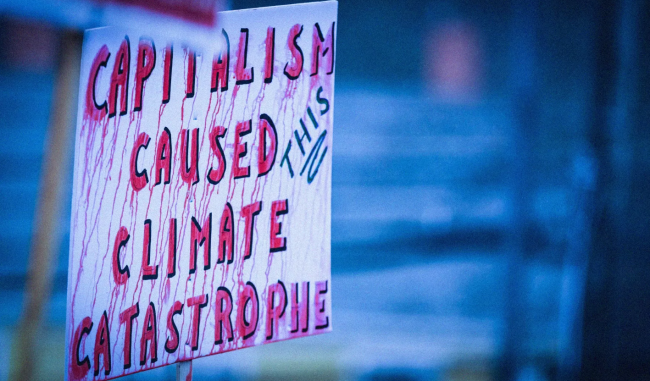Articles Menu

Nov. 28, 2023
The UN climate summit—hosted this year by the United Arab Emirates, a major oil producer—begins Thursday in Dubai. It will review the progress on countries’ 2015 Paris Agreement commitments toward limiting rising global temperature to 2 C, preferably 1.5 C, above pre-industrial levels. It will also define what new commitments countries can agree on to avoid planetary catastrophe.
The UN Environment Programme (UNEP) Emissions Gap Report 2023: Broken Record – Temperatures hit new highs, yet world fails to cut emissions (again), ” was released days before COP28, and found current country pledges under the Paris Agreement put the world on track for a temperature rise between 2.5 and 2.9 C above pre-industrial levels this century.
According to the report, Canada has a 27 per cent gap—the largest among G20 nations—between its current emissions reduction policies and its 2030 pledges. The federal government’s fall fiscal update contains no new measures to change what Canada’s Environmental Commissioner described as three decades of broken government climate commitments.
Canadian financial institutions—both public and private—are essential to the fossil fuel industry. According to the 2023 UN Production Gap Report, Canada is the largest public financer per capita of fossil fuels production among G20 nations.
Although Export Development Canada is the main financier, the government also finances this hugely profitable industry through tax subsidies—notably the carbon capture tax credit (CCUS)—which are not aligned with credible net-zero pathways nor with Canada’s 2030 emissions reduction targets.
Fossil fuel companies continue to promote carbon capture as the solution that allows them to continue expanding production instead of transitioning to renewables, despite an International Energy Agency report urging Canadian petroleum companies to stop making false promises they knowingly perpetrate, that CCUS is a viable solution to the climate crisis.
Canada’s five largest banks’ fossil fuels investments have ballooned since 2015.
In 2022, the largest five Canadian banks financed almost 90 per cent of the highest polluting oil sands production. Foreign banks have largely exited this sector.
A Canadian Banks Net Zero Policy Report Card prepared by Investors for Paris Compliance concluded that “Canada’s banks lack net-zero urgency.” It found that no bank provides a measurable standard which defines “sustainable activity,” and most are only reporting emissions associated with a small fraction of their lending activity.
Canada’s major pension funds are not on track to protect pensions from climate risks. A recent analysis of climate disclosures of major pension funds by Shift Action, described pension funds as having “cognitive dissonance” in their disregard for accelerating climate risks.
CPP investments manages public pensions for most Canadians. Its fossil fuel investments have increased 50 per cent since 2017, with one-third of its assets in private equity firms, largely hidden from public scrutiny.
Canada’s largest life insurance companies, Sun Life and Manulife, still had $15.9 billion USD and $9.9 billion USD respectively invested in fossil fuels in 2022, despite the fact that economic damages stemming from climate change could cost the Canadian economy up to $5.5 trillion this century.
In the preface to a UN High-Level Expert Group report on the Net-Zero Emissions Commitments of Non-State Entities, its chair, former Canadian Environment Minister, Catherine McKenna stated: “To effectively tackle greenwashing and ensure a level playing field, non‐state actors [including financial institutions] need to move from voluntary initiatives to regulated requirements for net zero.”
Although Canada’s federal financial institution regulator, the Office of the Superintendent of Financial Institutions (OSFI), has begun to provide financial institutions guidance in assessing their climate risks, full implementation of climate-related financial risk supervision is years away. Nor does it view ensuring financial institutions’ investments are aligned with Canada’s emissions reduction targets as part of its mandate.
Effective legislative and regulatory measures are necessary to reign in financial institutions for Canada to achieve its climate targets.
Senator Rosa Galvez tabled the Climate Aligned Finance Act, or Bill S-243, in the Canadian Senate in March 2022. This draft legislation is the gold standard to achieve Canada’s climate goals in the financial sector. Bill S-243, after much delay, is now before the Senate Banking and Finance Committee for witness testimony and review.
The proposed legislation would require that transitioning away from fossil fuels be a fundamental part of financial institutions’ business plans rather than an afterthought, as is the case now.
The legislation would align existing laws with government climate commitments, including requiring OSFI to mandate financial institutions develop climate targets, action plans, and progress reports. It would also require ensuring that financial institutions have capital adequacy requirements to protect against the eventuality of climate-related stranded assets.
It would hold corporate directors, officers, and administrators accountable for meeting the country’s climate commitments, ensure boards have climate expertise, and no conflicts of interest.
The Canadian Bankers Association, whose representatives testified before the Senate Banking Committee, unsurprisingly opposes S-243, which it views as derailing the status quo.
Canadian financial institutions are the lifeblood of the fossil fuel industry. Senator Galvez’ legislation is an essential precondition for government meeting its climate commitments going forward.
The Big Oil lobbying machine will be out in full force in Dubai, spreading falsehoods that net zero climate commitments can be reached while expanding production—with the support of their financial enablers.
Will Canadian governments do their part to prevent the world from going off the climate cliff? Hope, in these dark times, lies in actions of politicians like Senator Galvez—and in widespread citizen advocacy: climate litigators, those fighting for climate justice, for a global Fossil Fuels Non-Proliferation Treaty.
Bruce Campbell (he/him) is a former executive director of the CCPA. He is Adjunct Professor, York University, Faculty of Environmental and Urban Change; Senior Fellow, Toronto Metropolitan University, Centre for Free Expression.